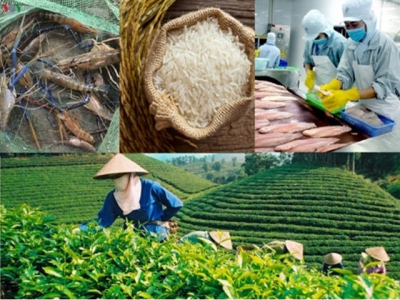Strict import requirements usher in changes to agricultural production

Tough quality requirements laid down by major importers are pushing local agricultural firms and farmers into changing their methods of production whilst boosting market expansion.
Several importing countries have imposed a set of strict standards on product quality as well as food safety and hygiene which are equal to, or even higher than those usually found among international importers.
Vietnam has joined 16 free trade agreements (FTAs), the most lucrative of which is the new-generation Comprehensive and Progressive Agreement for Trans-Pacific Partnership (CPTPP) . These FTAs are expected to enable Vietnamese exporters to enjoy extensive tariff cuts.
However, despite the initial or complete removal of tariffs, a number of other barriers have been emerging for the nation’s exporters as many importing countries have imposed stringent quality and quarantine regulations on agro-aquatic imports.
China for instance is the most significant market for Vietnamese farm produce, but has been hardening its rules related to product origin, export registration, and packing, according to To Ngoc Son, deputy head of Asia-Africa Market Department under the Ministry of Industry and Trade.
Furthermore, Japan, the Republic of Korea, and some ASEAN members have also toughened animal and plant quarantine regulations for imports. Some of these nations have imposed a set of strict standards on product quality as well as food safety and hygiene which are equal to, or even higher than those usually found among international importers.
Nguyen Xuan Cuong, Minister of Agriculture and Rural Development, admitted that the domestic agricultural sector is currently running on small scale with a fragmented production process, therefore making it difficult to satisfy standards set by demanding importers.
As such, Cuong noted the need to define and tap into certain advantages of each farm produce as well as to step up the use of cutting-edge scientific and technical applications in agricultural production. These advancements could help local farm produce penetrate further into domestic and overseas markets.
Agricultural production must stick closely to various market requirements, Cuong said, claiming this as an unavoidable trend.
He explained that the domestic market, with the urbanization rate of some 40 per cent is in increasing demand for high-quality products, while the global market of 7.5 billion consumers has far more varied consumption demands.
Developing national brands for farm produce
The country has so far managed to create national brands for tea and rice products and is currently working on developing two national brands for shrimp and tra fish (catfish) products.
Building brands for different farm produce is an essential pathway for sustainable development in the local sector, Minister Cuong stressed.
Assoc. Prof. Dr. Nguyen Quoc Thinh, an adviser to the Vietnam National Brand Program, claimed that most farm produce exports are raw and preliminarily processed products; hence they lack clear information about their producers or processing firms, and even their geographical origin.
As a result, the added value which agricultural exports bring about falls short of expectations while high risks remain for many farm produce shipments, Thinh said.
He gave an example that up to 100 firms have joined the export of Vietnam-branded rice, however the brand will suffer negative effects if only one of the exporters sends poor quality rice shipments abroad.
Branding goes beyond a simple logo, image, and slogan, but it is aimed to build consumer trust and familiarity, the expert said. He called for a drastic approach to be taken to building and protecting national brands for the long-term benefit of farm produce exports.
Vietnamese farm produce has so far penetrated 180 countries and territories while the country has leapt up to the 2nd largest exporter of farm produce in Southeast Asia and 15th in the world.
The agricultural sector this year looks to earn US$43 billion from exports. In order to reach the target, Minister Cuong highlighted the significance of further restructuring agricultural production and categorizing the structure of three key groups at respective national, provincial, and communal levels.
Có thể bạn quan tâm
 Agricultural products export billions of USD plunged together
Agricultural products export billions of USD plunged together Different from the "sweet fruit" achieved in 2018, right at the beginning of 2019, export of many key agricultural products is in the "top" of billion USD
 Farm produce exports face RoK’s rigid rules
Farm produce exports face RoK’s rigid rules Farm produce exports to the Republic of Korea, including those from Vietnam, are subject to the East Asian country’s stringent food safety rules
 Hi-tech innovation revolutionises a Limpopo citrus farm
Hi-tech innovation revolutionises a Limpopo citrus farm When Stefan and Anné Pretorius established Katlego Sitrus more than a decade ago, they decided to re-evaluate everything they knew about farming